There was a period of brilliant development, but the Vietnamese gaming industry has been gradually "shrinking" in recent years due to many reasons, from the story of management not keeping up with development, to the massive influx of international pirated games.
Downsizing
If in the past, the Vietnamese game industry mainly published foreign games (accounting for 90%) in the domestic market, in recent years, Vietnamese game production has made strong progress globally. According to the App Annie 2020 rankings, Vietnam ranked 7th in the world , 2nd in Southeast Asia in terms of the number of downloaded games.
In addition, Vietnam also ranked 3rd in the top 10 game application producers in the region; for every 25 downloaded games, 1 game is produced in a Vietnamese studio. According to statistics from Sensor Tower and the Vietnam Game Studio Club, there are currently about 5,000 games produced by Vietnamese people, focusing mainly on content for children, entertainment, andeducation .
Notably, there are games produced by Vietnamese people that are at the top of the app stores in the US, Japan, and even China (the number 1 country in games), such as Skydancer by Topebox or Piano Tiles 3 by Amanotes...
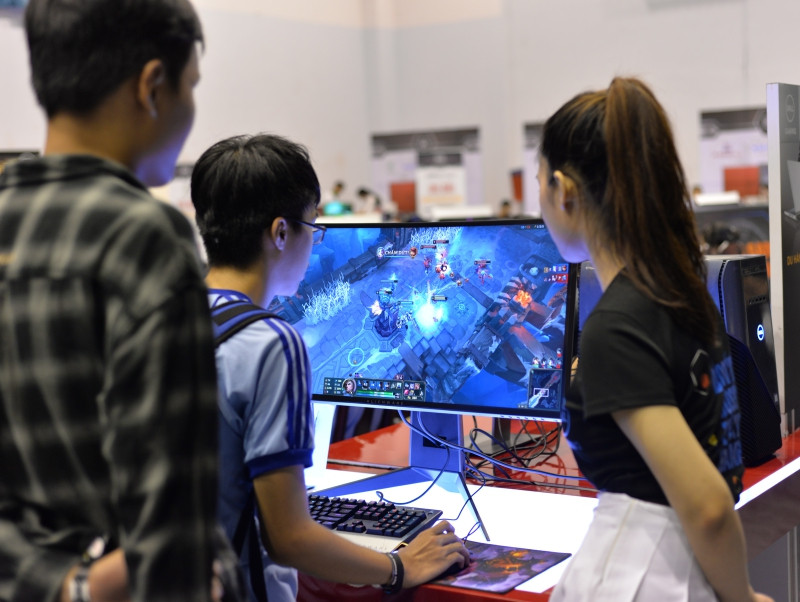
There was a period of brilliant development but the Vietnamese gaming industry has been gradually "shrinking" in recent years. Photo: TL
The development of the game production sector has brought many job opportunities and attractive salaries. Currently, many training facilities in game-related majors such as programming, design, graphics, etc. have been focused on by universities and training centers, meeting the demand for providing highly qualified human resources for the game industry. The domestic game industry's revenue in recent years has also had positive growth. According to a report by the Ministry of Information and Communications , the game industry's revenue in 2021 reached more than 7 trillion VND, expected to reach more than 10 trillion VND in 2022.
However, the gaming industry later had to downsize for many reasons. A report from the Department of Radio, Television and Electronic Information (Ministry of Information and Communications) said that by the end of November 2022, 248 businesses had been granted licenses to provide G1 online gaming services (of which 54 businesses had stopped operating or had their licenses revoked). The number of games granted content and script approval decisions was 1,327 (856 games were being released, 471 games had announced to stop releasing).
Looking at the report, we can see that the gaming industry is very large with hundreds of participating businesses, more than 1,300 games released, but currently the number of businesses operating in the industry can be counted on the fingers. Online games in Vietnam developed the most strongly from 2006-2010, with the success of Vo Lam Truyen Ky released by VNG, followed by the rise of VTC, FPT Online, Asiasoft, Deco, Sunsoft, Garena, Sgame... later added Soha games, Mecorp, CMN Online, Gamota and Funtap. At its peak, there were 20-25 businesses operating in the industry.
However, from 2010 to 2012, management could not keep up with the development, online games were condemned by society, and the authorities temporarily stopped issuing licenses. In addition, some businesses were caught up in legal trouble because the law lacked relevant regulations... causing the game industry to start to decline. FPT Online, Asiasoft, Sgame, Sunsoft, Mecorp left the game one after another; Deco, CMN Online became increasingly smaller.
After 2012, the gaming industry only revolved around a few familiar businesses, success only belonged to large businesses such as VNG, VTC and VE (Garena Vietnam changed its name). There was a period when Gosu, Soha games, Gamota and Funtab emerged, but the COVID-19 pandemic devastated the gaming industry once again. Typically in 2022, both Gamota and Funtap had to cut more than 50% of their staff, Gosu and Soha games also faced many difficulties.
Gosu even moved into a new technology field by adding the Blockchain game segment, but it was only successful for a short period. Notably, despite releasing thousands of games above, according to business representatives, the number of successful games that bring in revenue and profit is very small, only 5-10%.
Need for synchronous policies for Vietnamese game startups to stay in the country
Currently, there are many domestic start-ups and businesses in the gaming industry that have moved abroad to enjoy preferential policies in the host country... Among Vietnamese game production studios, the number of studios headquartered in the country is very small, the rest are located in many places around the world, mainly Singapore. Vietnam's gaming revenue in 2018 reached 365 million USD, in 2021 it reached 665 million USD, but the amount of tax paid to the State only accounted for 50%, the rest is individuals and organizations paying taxes to foreign countries.
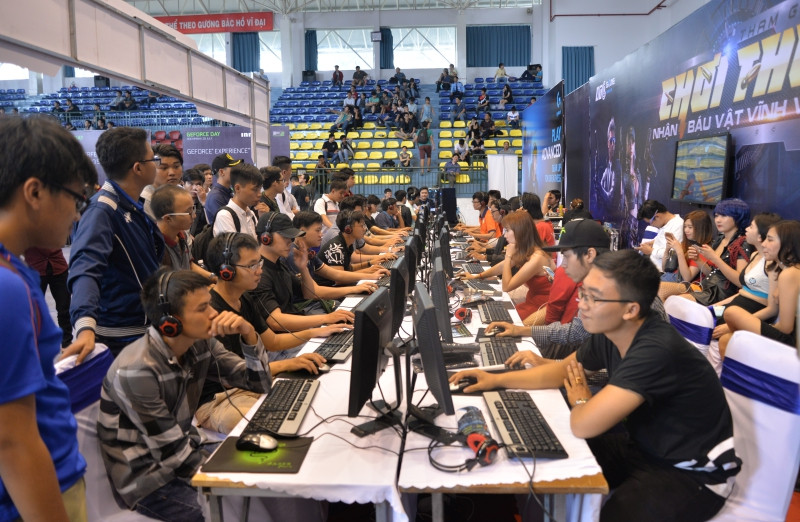
Many people still believe that games are bad, violent or addictive.
Experts and many businesses say that there is a trend of Vietnamese game companies establishing themselves abroad and hiring programmers in Vietnam to produce games. Many Vietnamese game companies have been established and successfully operated abroad, leading to a “bleeding” of resources.
A representative of a well-known gaming company in Vietnam said: recently there has been a "wave" of startups and young people making games moving their headquarters to Singapore and Dubai in the United Arab Emirates (UAE) to establish businesses.
Not only games, but many new technology startups such as blockchain have also chosen to register their businesses in countries with more open and favorable policies to limit policy risks when the orientation and legal corridor for this field in Vietnam are not clear. A typical example of this trend is Sky Mavis - a Vietnamese "unicorn" with the famous game Axie Infinity. This is a Vietnamese startup, the founder is Vietnamese, the staff is mostly Vietnamese, but the headquarters is located in Singapore, paying taxes to Singapore.
Mr. Thai Thanh Liem - CEO of Topebox believes that Vietnamese start-ups and game studios going abroad to establish businesses and pay taxes abroad is a sad thing for a developing country like Vietnam. The loss of revenue in one of the digital business segments with a high revenue proportion, in addition to causing economic losses for Vietnam, also shows that the assessments of state agencies on this industry are not thorough and need to make appropriate adjustments if domestic game businesses are to return to their homeland.
Some opinions see Vietnamese game businesses as only at the potential level, in a nurturing state, while there are still too many risks and policy barriers that prevent them from contributing, forcing them to go abroad. Meanwhile, in other countries, specifically Singapore, there are many incentives for businesses in this field. Game production businesses in Singapore do not have to apply for a license to provide electronic game services and a license to approve script content for each game product and there are clear preferential policies on taxes...
According to representatives of some businesses, tax regulations in Vietnam are quite complicated, making it difficult for game companies to understand and operate effectively. Specifically, high corporate tax rates and complicated tax filing requirements.
Additionally, access to funding can be a challenge for gaming companies in Vietnam, especially if they are startups. While there are a number of local investors and venture capital firms focused on the gaming industry, they may not be as numerous or well-funded as in other countries.
Intellectual property protection remains a difficult issue in Vietnam. There have been several cases of game companies being hit with copyright infringement or other forms of IP theft. This can make it difficult for companies to protect their valuable gaming assets and intellectual property...
From the perspective of a startup expert, Mr. Cris Duy Tran believes that blockchain games, tokens, digital assets and digital finance in Vietnam are still unclear in terms of law. Without a clear legal definition of one of the important elements in the game, it will be very difficult to be recognized in Vietnam. Therefore, startups in this field will not establish organizations and officially operate in Vietnam. The only factor that these businesses want to take advantage of in Vietnam is human resources.
To attract businesses and startups in this field to the country, Vietnam should start with a policy testing sandbox model, which includes full policies and legal corridors at a certain scale. From this sandbox model, Vietnam will clearly see what the legal corridor actually needs.
Mr. Cris Duy Tran said that Singapore has a series of preferential mechanisms and policies, so startups and brainpower will naturally flow to Vietnam. Of course, it will take time to attract and pull foreign game studios to Vietnam. When businesses clearly see a change in society's open perception of games, they will gradually return.
Mr. Nguyen Ngoc Bao - General Director of VTC believes that the game industry needs to be nurtured to develop. According to Mr. Bao, the revenue of the game industry in Vietnam is still very small compared to the world, less than 1% compared to the global market of 200 billion USD (according to Newzoo), requiring game production and publishing enterprises to make great efforts. In addition, there needs to be incentives from the authorities to nurture and promote the industry to gradually assert itself in the international market.
Another thing that supports the development of the gaming industry, according to Mr. Bao, is changing the community's awareness because nowadays games are not only for entertainment but are used in many areas of life. For example, games are used to teach, simulate activities in society, use games to treat depression, sports tournaments (eSport)... However, many people still think that games are bad, violent or addictive.
Removing "bottlenecks" for the development of the Vietnamese gaming industry
In 2016, the Government issued a Decision approving the Strategy for Development of Vietnam's Cultural Industries to 2020, with a vision to 2030, identifying "software and entertainment games" as one of 13 areas for cultural industry development.
In November 2021, the Government issued a Decision approving the Strategy for Vietnam's Cultural Development to 2030, which has specific policies to support the development of cultural industries in Vietnam.

Games are still not considered a priority industry in the development of cultural industries.
However, in both of these most important documents, games are still not considered a priority industry in the development of the cultural industry. Most of the current regulations are related to licensing and management of games, but there are no specific policies to support the development of this industry.
According to Mr. Le Quang Tu Do, currently, state management agencies are adding many regulations to limit the negative aspects, while promoting the positive aspects of the video game industry. In addition, the representative of the management agency also said that in the coming time, some regulations may be issued to limit the negative aspects, helping the domestic video game industry to develop further.
“We have added legal regulations and plan to issue them in the first half of 2023 at the government decree level, tightening the gaming time in a day to no more than 3 hours for young people and tightening age classification,” Mr. Do shared.
Mr. Do also stated that one of the “bottlenecks” limiting the Vietnamese gaming industry is tax. According to regulations, software production enterprises are entitled to a 10% tax reduction, but gaming enterprises that both produce and distribute software are not entitled to this incentive because they are considered publishing enterprises.
Next, it is necessary to change society's prejudices about the gaming industry. "As long as society still considers gaming a bad industry, the industry will never develop strongly." Mr. Do also said that the final bottleneck is the rampant situation of pirated games and unlicensed cross-border games, making it impossible for domestic game publishers to compete.
The Ministry of Information and Communications has built a 5-year roadmap for game development from 2022 to 2027, focusing on solving major issues: building preferential game policies and mechanisms, attracting companies headquartered abroad back to Vietnam; managing the game market; organizing events to promote investment and trade cooperation between domestic game companies, with investment funds as well as management agencies to find a common voice; supporting human resource training for the game industry to master based on the hands and minds of Vietnamese people.
Khanh An
Source


![[Photo] Prime Minister Pham Minh Chinh chairs meeting on science and technology development](https://vphoto.vietnam.vn/thumb/1200x675/vietnam/resource/IMAGE/2025/5/17/ae80dd74c384439789b12013c738a045)
![[Photo] National conference to disseminate and implement Resolution No. 66-NQ/TW and Resolution No. 68-NQ/TW of the Politburo](https://vphoto.vietnam.vn/thumb/1200x675/vietnam/resource/IMAGE/2025/5/18/adf666b9303a4213998b395b05234b6a)

![[Photo] More than 17,000 candidates participate in the 2025 SPT Competency Assessment Test of Hanoi National University of Education](https://vphoto.vietnam.vn/thumb/1200x675/vietnam/resource/IMAGE/2025/5/17/e538d9a1636c407cbb211b314e6303fd)


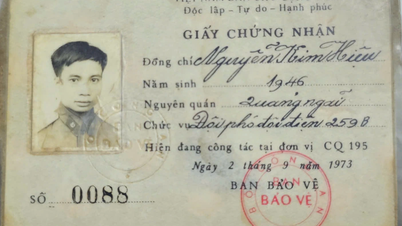





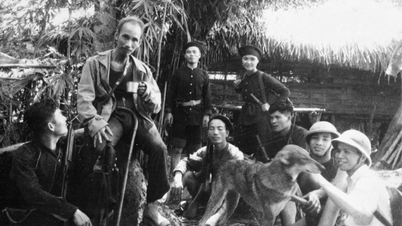













![[Photo] Readers line up to visit the photo exhibition and receive a special publication commemorating the 135th birthday of President Ho Chi Minh at Nhan Dan Newspaper](https://vphoto.vietnam.vn/thumb/1200x675/vietnam/resource/IMAGE/2025/5/17/85b3197fc6bd43e6a9ee4db15101005b)

















































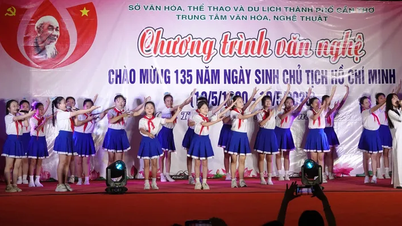
















Comment (0)